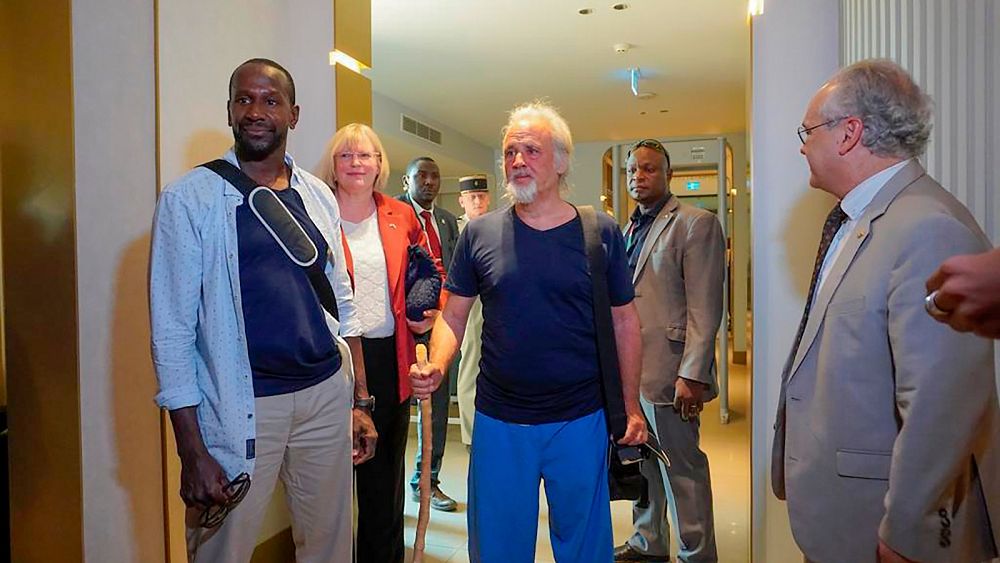
A French journalist an an American aid worker held hostage in West Africa were both freed on Monday.
Officials in Niger unexpectedly announced Monday morning that Olivier Dubois and Jeffery Woodke had taken a special flight to the country’s capital but provided no details.
US officials said that the American hostage was not freed in Niger but in the surrounding region that includes Mali, where Dubois was abducted in 2021.
Both men appeared to be physically well when they met briefly with a small group of journalists in Niamey. Dubois, abducted almost two years ago, smiled broadly as he was greeted by well-wishers, saying he was tired but otherwise fine.
“It’s amazing for me to be here, to be free,” the 48-year-old journalist said. “I didn’t expect it at all. I would like to pay tribute to Niger, and to its knowledge of these types of delicate missions. And to pay tribute to France and to all those who made it possible to be here today.”
Woodke, who was tanned, had his long grey hair in a ponytail, and used a walking stick, did not speak. He was abducted six years ago.
American officials said no ransom had been paid for Woodke’s release, and praised Niger’s government for helping to gain his freedom. The French government did not comment on how journalist Olivier Dubois’ freedom was won.
Last week, US Secretary of State Antony Blinken made a visit to Niger, where he announced $150 million (€140 million) in direct assistance to the Sahel region.

The two men were the highest-profile foreigners known to be held in the region, and their release was the largest since a French woman and two Italian men were freed together in Mali back in October 2020.
The press organisation Reporters Without Borders, which had long pushed for Dubois’ release, said that “we feel joy and immense relief,” and thanked French authorities.
Woodke had been kidnapped from his home in Abalak, Niger, in October 2016 by men who ambushed and killed his guards and forced him at gunpoint into their truck, where he was driven north toward Mali’s border.
Authorities believe he was being held by an al-Qaida-linked militant group known as JNIM and said her husband’s captors had made a multi-million-dollar ransom demand for his release.
Dubois also was being held by JNIM militants, though it was unclear how much time the two foreign hostages had spent in captivity together, said Laith Alkhouri, CEO of Intelonyx Intelligence Advisory.
Groups have long abducted hostages for ransom in the Sahel, the vast, semi-arid expanse below the Sahara Desert.
Previously released captives have described being moved frequently from site to site in harrowing conditions amid sweltering temperatures. The extremists aim to use millions in ransom to fund their jihadi operations, though not all countries engage in payment negotiations.
On Monday, the International Committee of the Red Cross announced that two of its employees were freed in Mali. The organization would not disclose the employees’ identities or the circumstances of the abduction, and it could not be confirmed if there was any connection to the other hostages whose release was announced the same day.
At least 25 foreigners and untold numbers of locals have been kidnapped in the Sahel since 2015, according to the Armed Conflict Location & Event Data Project. In 2020, Swiss authorities said Christian missionary Beatrice Stoeckli was killed by her militant captors.
Militants with links to al-Qaida and the Islamic State group are believed to still be holding a number of captives, including a German priest. The Reverend Hans-Joachim Lohre was preparing to celebrate Mass in Mali’s capital when he was abducted last November.
Last year an Italian couple and their child were abducted with a household employee in southern Mali.



